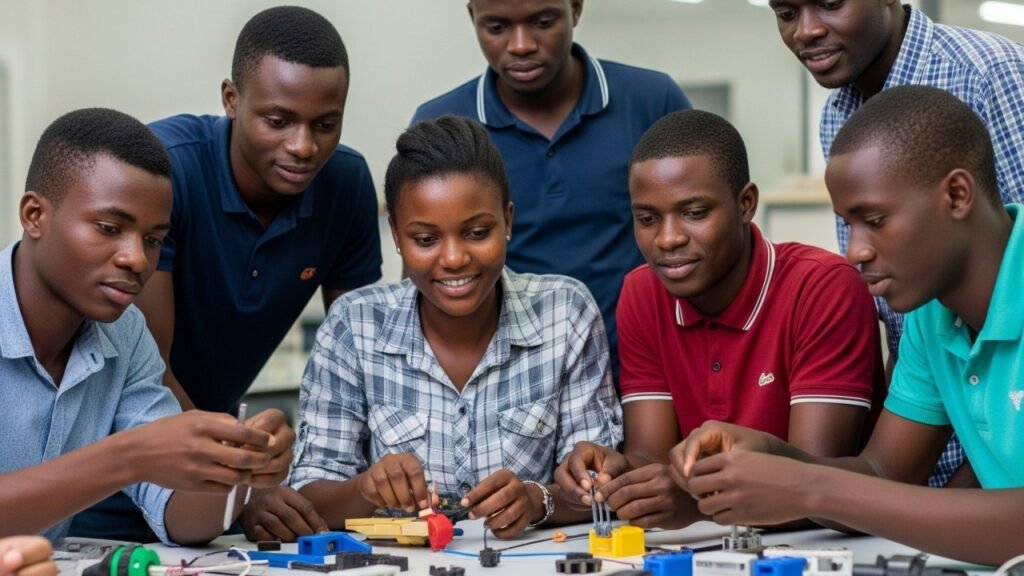In a bold statement that is resonating through education circles across Africa, strategy consultant and EdTech pioneer Meron Tessaw is challenging conventional wisdom: to truly uplift learning, the continent must stop treating education as merely a noble cause and start treating it like a scalable enterprise. Tessaw argues that business strategy and technology are not antagonists to schooling—they are its future.
Tessaw’s journey isn’t just theoretical. As co-founder of Ethio IQ, she has overseen a model that ties instructional methods to data, accountability, and market discipline. Under her leadership, Ethio IQ achieved a 100 per cent pass rate in its 2023 Grade 12 cohort—turning around what had once been a dismal failure rate in Ethiopia’s public education system. Her message is clear: passion alone won’t fix learning; systems designed to deliver results will.
Table of Contents

From Crisis to Classroom: The Ethiopian Backdrop
To grasp the urgency of what Tessaw is advocating, consider Ethiopia’s educational landscape in recent years. Between 2014 and 2016, national failure rates in the Grade 12 exams were reported as high as 95 to 97 per cent. In some communities, that translated to widespread disillusionment—students questioning whether continued schooling was worth the effort, and families struggling to see the return on investment.
Classrooms were overcrowded. Resources were thin. Many students could not access the coaching, feedback, or personalised attention they needed to succeed. The traditional model—one teacher trying to serve dozens or even hundreds of students—was straining under the weight of demand. Tessaw recalls that the lack of systemic structure meant that even the most passionate teachers couldn’t “scale” effectively.
What Ethio IQ proposes is a counter-narrative. Instead of leaving student success to hope and goodwill, the startup embeds metrics, feedback loops, and targeted supports—much like a business tracks customer churn or product uptake. In Tessaw’s view, the same strategic tools that optimise business outcomes can optimise learning outcomes.
How Business Strategy + Tech Can Rewire Education in Africa
Tessaw outlines several pillars by which technology and business thinking can rewire educational systems across the continent. Below are four of the critical levers she highlights (and that any serious reformer ought to heed):
- Data-Driven Personalisation
In a typical classroom, students of varying learning levels compete for the teacher’s attention. Through smart adaptation—powered by learning analytics and diagnostics—EdTech tools can tailor exercises, pacing, and feedback to each child. Tessaw’s model at Ethio IQ uses continuous assessment to trigger individualised interventions. Students don’t fall through the cracks; the system flags them early. - Operational Discipline and Accountability
Borrowing lessons from the corporate world, Tessaw contends that schools must set and track KPIs (key performance indicators). These might include student engagement metrics, progress milestones, or teacher response times. Accountability loops ensure alignment between leadership, teachers, and students—just as in any high-performing enterprise. - Sustainable Scale with Innovation
A patchwork of pilot programs will not move the needle. Teachers in Lagos, Yaoundé, or Addis Ababa must be able to adopt tools and methods without relying on foreign consultants or sporadic grants. Tessaw is confident that modular, scalable EdTech platforms—particularly ones built to support local languages and contexts—make expansion feasible. Ethio IQ is already working to expand from secondary to primary learners and to local language instruction. - Strategic Partnerships and Capital
It’s one thing to build a great product; it’s another to distribute it across regions with diverse infrastructure, regulation, and funding realities. Tessaw has engaged with global funders—such as the Mastercard Foundation and the Reach for Change EdTech Fellowship, which awarded Ethio IQ USD 60,000 in equity-free funds—to scale its reach. She argues that smart partnerships—with governments, NGOs, telecom providers, and funders—are essential to navigate local bottlenecks.
Put simply, technology is the tool, but business strategy is the operating system that ensures the tool actually works on the ground.

Why Africa’s Education Must Pivot—and How
If the stakes are ever higher, they’re here. A generation of learners is watching. Africa’s youth population is growing rapidly, and the gap between potential and opportunity looms ever larger. Traditional models—overreliant on infrastructure, underresourced staffing, and one-size-fits-all pedagogy—simply cannot carry the burden of mass upskilling.
Tessaw’s vision does not see business and education as adversaries—they are mutually reinforcing. The discipline borrowed from corporate strategy can help ensure that educational innovation is not fleeting or anecdotal, but measurable and sustained. In her words: “Business and education are not opposing forces; they are complementary.”
Her own path—working at Bain & Company in Seattle, earning prestigious fellowships, and then returning to apply those lessons in Africa—illustrates her belief that global exposure and local grounding must anchor one another. The success rate Ethio IQ recorded in 2023 was no fluke; it’s proof that the methodology works when execution is ruthless and data is respected.
Yet, Tessaw is pragmatic. Success will not come from copying Silicon Valley wholesale. She underscores the need for local language support, culturally appropriate content, teacher training and buy-in, and differential approaches for rural versus urban settings. Even the best tech platform must adapt to shaky power supply, patchy connectivity, and students who study under trees or behind closed doors.
She also pushes back on a narrative she sees too often: that African education reform is a matter of goodwill alone. “In education, we cannot rely on passion alone,” she says. What’s missing in many reform efforts is not heart, but precision. Without strategic scaffolding, even the most generous interventions fade away.
Across Africa, governments, school networks, and NGOs are watching closely. If Tessaw’s model proves repeatable across national borders, it could spark a wave of rethinking—one where ministries see EdTech not as a side project, but a central pillar. In that world, each student gains a companion in the form of technology; each teacher gains time and insight; and the system gains adaptability.
In the end, Tessaw’s message is as much hope as prescription: if Africa embraces the synergy of business strategy and technology, education need no longer be the weakest link in its development journey—but its brightest.

Business Strategy and Technology Are Transforming Education in Africa From Promise to Practice
This framework introduces both promise and challenge. Scaling across multiple countries means dealing with regulatory hurdles, procurement practices, accreditation, and entrenched resistance to change. But Tessaw believes the evidence is on her side. Ethio IQ’s results are not just anecdotal—but measurable improvements rooted in structure and methodology.
For ministers of education, philanthropists, tech entrepreneurs, and classroom practitioners contemplating the next big move, the takeaway is transformative: evolving education in Africa must be strategic, not solitary. Technology gives us reach; strategy gives us the discipline to use it well.
As Africa stands at a crossroads of demographic promise and educational urgency, the question isn’t whether to adopt technology—it’s how to embed it in systems that endure, not expire. Tessaw insists that if we get that how right, the story of education in Africa shifts from crisis to possibility.
Would you like me to expand this into a full SEO-ready web article with metadata, keywords, and internal link suggestions?
Join Our Social Media Channels:
WhatsApp: NaijaEyes
Facebook: NaijaEyes
Twitter: NaijaEyes
Instagram: NaijaEyes
TikTok: NaijaEyes





